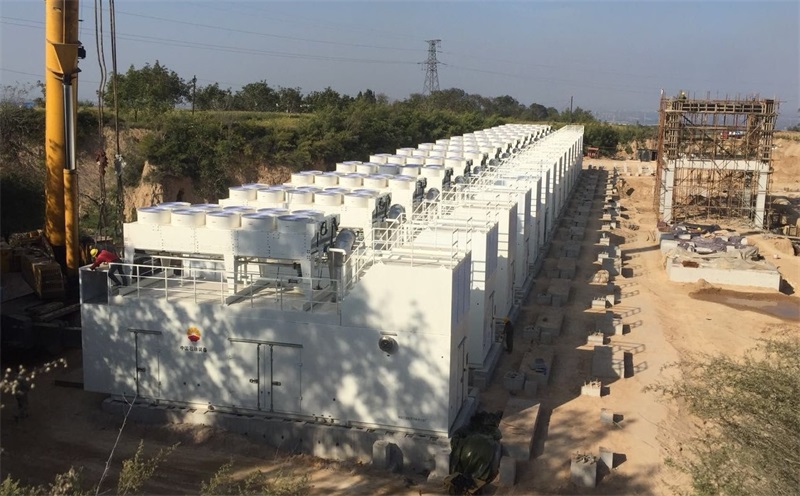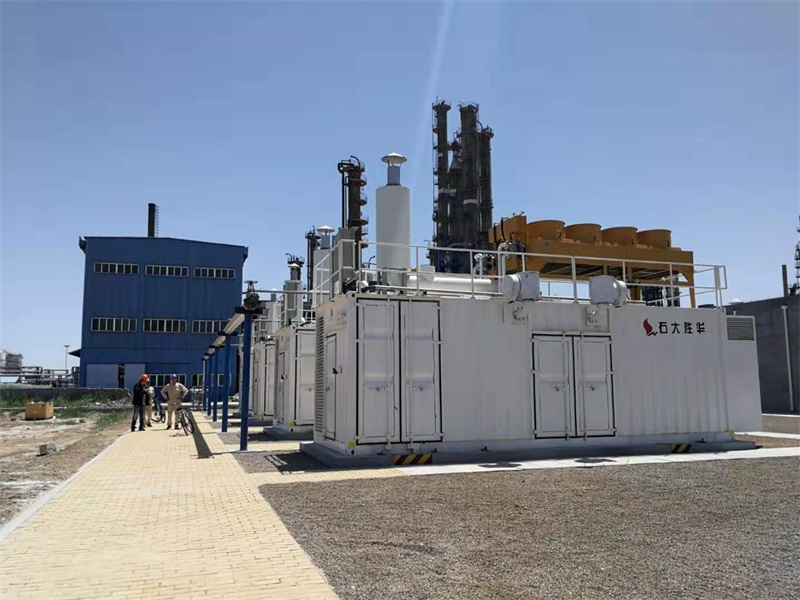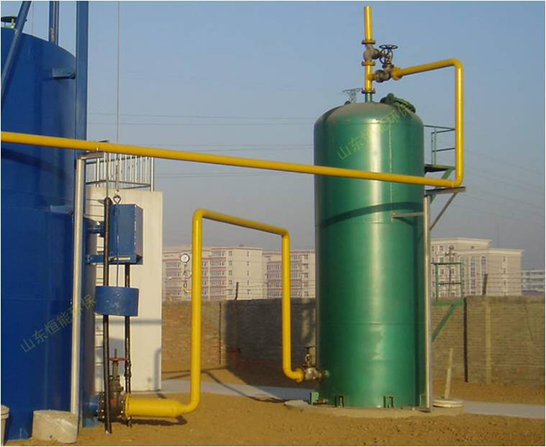燃煤發(fā)電機(jī)組鍋爐余熱使用探討
1、發(fā)電機(jī)組加裝板式換熱器。板式換熱器A 加裝在發(fā)電機(jī)組油冷卻系統(tǒng)中,高溫冷卻油由板式換熱器A1 角孔流入,冷水由A3角孔進(jìn)入板式換熱器,進(jìn)行熱交換后,低溫冷卻油從A2 角孔回流到發(fā)電機(jī)組,溫水由A4 角孔流入板式換熱器B;板式換熱器B 加裝在發(fā)電機(jī)組水冷卻系統(tǒng)上,高溫冷卻水由角孔B1 流入板式換熱器,與進(jìn)入板式換熱器B 的溫水進(jìn)行熱交換后回流到發(fā)電機(jī)組,熱水由B4 角孔流出。經(jīng)過熱交換,由A3 角孔進(jìn)入的常溫水,從B4 角孔流出后溫度在75 ~80 ℃。
1. The generator set is equipped with plate heat exchanger. The plate heat exchanger a is installed in the oil cooling system of the generator set. The high-temperature cooling oil flows into the plate heat exchanger from the A1 corner hole, the cold water enters the plate heat exchanger from the A3 corner hole, and after heat exchange, the low-temperature cooling oil flows back to the generator set from the A2 corner hole, and the warm water flows into the plate heat exchanger B from the A4 corner hole; Plate heat exchanger B is installed on the water cooling system of the generator set. The high-temperature cooling water flows into the plate heat exchanger from corner hole B1, exchanges heat with the warm water entering plate heat exchanger B, and then flows back to the generator set, and the hot water flows out from corner hole B4. After heat exchange, the temperature of normal temperature water entering from A3 corner hole and flowing out from B4 corner hole is 75 ~ 80 ℃.
2、供水管路設(shè)計(jì)。礦井高位水池通過閘閥12 向瓦斯發(fā)電機(jī)組冷卻水池供冷水,冷卻水池內(nèi)冷水流向發(fā)電機(jī)組板式換熱器加熱,然后通過閘閥1 流入加裝保溫棉的保溫水箱內(nèi)。在熱水使用低峰期可通過閘閥2、閘閥3流向冷卻水塔,對(duì)熱水冷卻降溫,然后循環(huán)使用。當(dāng)保溫水箱內(nèi)水溫降低時(shí),可通過閘閥5 將低溫水回流到冷卻水池。正常用水時(shí),關(guān)閉閘閥13,打開管道泵兩端閘閥,打開閘閥14 及水箱入口閘閥,使用綜合泵房內(nèi)管道泵將保溫水箱內(nèi)熱水排入澡堂水箱,供職工澡堂使用。當(dāng)澡堂水箱內(nèi)熱水溫度降低后,可通過閘閥13 將溫水回流到冷卻水池。
2. Water supply pipeline design. The mine high-level water tank supplies cold water to the gas generator unit cooling water tank through the gate valve 12. The cold water in the cooling water tank flows to the generator unit plate heat exchanger for heating, and then flows into the thermal insulation water tank equipped with thermal insulation cotton through the gate valve 1. During the low peak period of hot water use, it can flow to the cooling water tower through gate valve 2 and gate valve 3, cool the hot water, and then recycle it. When the water temperature in the insulation water tank decreases, the low-temperature water can be returned to the cooling water tank through the gate valve 5. When using water normally, close the gate valve 13, open the gate valves at both ends of the pipeline pump, open the gate valve 14 and the gate valve at the inlet of the water tank, and use the pipeline pump in the comprehensive pump house to discharge the hot water in the thermal insulation water tank into the bathhouse water tank for use by the staff bathhouse. When the hot water temperature in the bathhouse water tank decreases, the warm water can be returned to the cooling pool through the gate valve 13.
3、加裝自動(dòng)控制。安裝溫控裝置對(duì)閘閥5 進(jìn)行控制,在溫控開關(guān)上設(shè)置相應(yīng)溫度,當(dāng)水溫降低到設(shè)置溫度以下時(shí)閘閥5 打開,將冷水回流,重新通過余熱利用裝置加熱。在澡堂水箱內(nèi)安裝水位控制裝置并設(shè)置水位,當(dāng)水位降低到水位時(shí),相應(yīng)閘閥打開,管道泵起動(dòng),向澡堂水箱加水;當(dāng)澡堂水箱水位達(dá)到水位時(shí),相應(yīng)閘閥關(guān)閉,管道泵停止運(yùn)行。增加澡堂水箱溫控裝置,澡堂水箱水溫降低時(shí),通過閘閥13、閘閥14、閘閥15 或閘閥16 將低溫水回流,重新經(jīng)過余熱利用裝置加熱。通過加裝自動(dòng)控制裝置,減少人工操作步驟,降低了人員投入和工人勞動(dòng)強(qiáng)度。
3. Add automatic control. Install a temperature control device to control the gate valve 5. Set the corresponding temperature on the temperature control switch. When the water temperature drops below the set temperature, the gate valve 5 opens to return the cold water and heat it again through the waste heat utilization device. Install a water level control device in the bathhouse water tank and set the water level. When the water level drops to the minimum water level, the corresponding gate valve opens and the pipeline pump starts to add water to the bathhouse water tank; When the water level of the bathhouse water tank reaches the maximum water level, the corresponding gate valve is closed and the pipeline pump stops running. Add a temperature control device for the bath water tank. When the water temperature of the bath water tank decreases, the low-temperature water will be refluxed through gate valve 13, gate valve 14, gate valve 15 or gate valve 16 and heated again by the waste heat utilization device. Through the installation of automatic control device, the manual operation steps are reduced, and the personnel input and labor intensity are reduced.、


4、創(chuàng)造的效益。發(fā)電機(jī)組余熱利用系統(tǒng)正常運(yùn)行后,該礦停止使用原有的2臺(tái)4t 燃煤蒸汽壓力鍋爐,每年可節(jié)約燃煤2000 t,每年可減少燃煤鍋爐維修費(fèi)用、各種檢驗(yàn)檢測費(fèi)用。
4. Benefits created. After the waste heat utilization system of the generator set operates normally, the mine stops using the original two 4T coal-fired steam pressure boilers, which can save 2000 t of coal every year and reduce the maintenance cost and various inspection and testing costs of coal-fired boilers every year.
使用燃煤鍋爐排放大量硫化物等污染物,對(duì)環(huán)境造成污染。瓦斯發(fā)電機(jī)組余熱利用則為清潔能源,全程無污染物的排放,具有極高的環(huán)保效益。燃煤蒸汽鍋爐使用壓力容器,具有一定的爆炸危險(xiǎn)性,余熱利用系統(tǒng)比原有的燃煤蒸汽壓力鍋爐更加安全。余熱利用系統(tǒng)安裝后,提升了發(fā)電機(jī)組冷卻系統(tǒng)的冷卻效果,延長了部分配件的使用壽命。
The use of coal-fired boilers releases a large number of sulfide and other pollutants, which pollutes the environment. The waste heat utilization of gas generator set is clean energy with no pollutant emission in the whole process, which has high environmental protection benefits. The coal-fired steam boiler uses pressure vessels, which has a certain explosion risk. The waste heat utilization system is safer and more efficient than the original coal-fired steam pressure boiler. After the installation of the waste heat utilization system, the cooling effect of the generator unit cooling system is improved and the service life of some accessories is prolonged.
 在線咨詢
在線咨詢 官方二維碼
官方二維碼




 當(dāng)前位置:
當(dāng)前位置: 2021.12.31
2021.12.31










